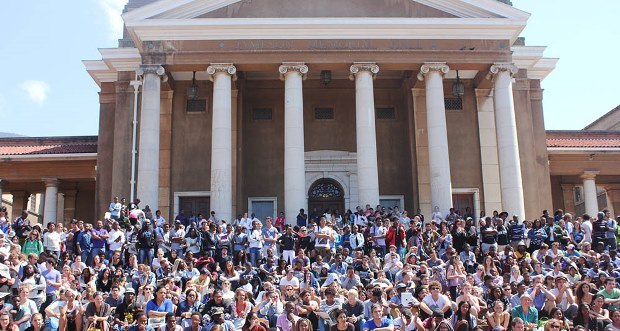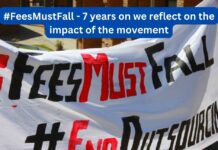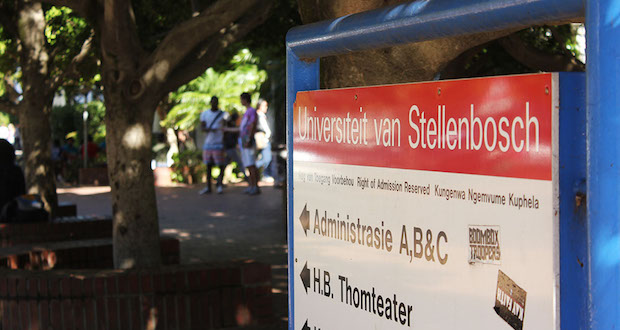A group of concerned black law students and alumni at UCT has released a statement regarding the UCT Law faculty’s attitude towards protests and securitisation of campus.
In the reawakening of the nationwide FeesMustFall protests, students have relaunched the shutdown of institutions such as the University of Cape Town (UCT) as a means of pushing towards the call for free decolonised education. In the middle of this protest action, the Law faculty finds itself precariously on the other side of restorative justice and civility, which is ironic given their reductive over-glorification of a failed and discredited TRC that many of them facilitated as a poetic testament to their disingenuousness.
In an impromptu meeting held by the Dean, Penny Andrews, and presided by a majority white student audience, the meeting was characterised by one simple question: how do we appease white fragility? In doing so, she contributed to the already existing tensions and divisions by stating that the faculty is the intellectual home of her (majority white) student audience and they have a right to defend themselves; inferring that when people invade your home you a have right to retaliate. In this case, black student protestors are compared to home invaders, the violent stereotyped swart gevaar. Adding insult to injury, she went as far as comparing black protestors to children that need to screamed and shouted at – essentially abusing her power and discretion in the space. One can only wonder for how long blacks must eat disrespect in institutions like UCT that fail to recognise their complicity in the turbulent path towards our self-determination and emancipation in a society that insists and strives on our inferiority.
This callous and irresponsible line of thinking disregards the real sense that students revolt against the system not because they do not take pleasure in cultivating their intellectual curiosity, but they draw the line in the sand simply because they can no longer breathe in institutions that continue to systematically stifle any of their attempts of participating in the university as fully-fledged subjects. Essentially, the Dean’s conduct is an incitement of violence and this is a vivid reflection of the faculty’s views on protest and black rage as something to be repressed. What she failed to understand is that her conduct as an institutional figure gives power to the manifestations of anti-blackness and fuels racial violence in a faculty that is already inundated with racialised micro-aggressions. Her consistent appeals to white upper class students for support on her reactionary positions are a testament to her insecurities in leadership and demonstrate a betrayal of the collective struggle that made it possible for a black woman to be dean in a racist institution like UCT after so many years. Instead of a moment of celebration, this is in fact a moment of mourning.
One can only wonder what the first choice black token would have been, but instead, we are left with the default applicant Penny Andrews, whose role thus far has been to appease white fears of die swart gevaar. We are inundated with accounts of black tokens who have been consistently used to silence and quell all dissent that might arise from blacks on the margins of the system. We are regularly reminded that these existential issues that we have with the institutional culture of the faculty and the alienating curriculum are a concoction of our imagination. After all, we have a black face, what more could we possibly want? All of this is done to obviate the blunt reality that the law faculty performs and reflects anti-black values of the broader institution.
The tokenisation of black administrators does not only legitimise the institution’s violence but weaponises people like Andrew against the very students that many people of her generation claim to have fought for and the consequences serve to only deepen the already existing intergenerational tensions. In light of the above, it becomes convincingly clear that when Andrew turns to a majority white student audience seeking their divine wisdom about what ought to be done about these “disruptions”, she is simply not here for these black delinquents.
Therefore, it is not astonishing to see the Law faculty publicly coming out in support of the the vice-chancellor’s push towards the securitisation of campus. Their support for the use of force and continued talk of militarising campus instead of dealing with the material issues raised by the very same students who they have sought to criminalise, is indicative of another attempt to structurally deny the legitimacy of black rage.
For a university that has insisted that there is no money and institutions of higher learning are under severe financial constraints, they have miraculously managed to find R2 million per month to secure private security thugs to protect the university property and community. Many of us are still trying to figure out at what point a public good became private property to be determined by individuals in the upper echelons of power. Moreover, who are they protecting us from when the same private security thugs hired to patrol campus are the people who are inciting sexual violence and sexually harassing women on campus with crude sexual slurs, making campus increasingly triggering and unpleasant?
Proponents of securitisation have made disingenuous rights-based arguments essentially saying that the current culture of protest infringes on the right to education and going as far as projecting a twofold argument of competing rights along with reasonable necessity of private security in so far as foreseeable risk is concerned, namely the risk of property damage and disruption of the academic calendar. The logic of this argument states that the reasonable response would be to minimise and guard against this risk by employing security personnel to shield the rights of those who wish to pursue their education. This position purports to create the view that there is a mutually exclusive “us” and “them”, and it disingenuously infers that those who are protesting have no vested interest in the pursuit of an education. This view fails to recognise that there are only students who experience a blend of these rights, financial exclusion is an enormous hindrance to accessing tertiary education. We can go as far as contending that it bars more students from accessing the right to an education than any protest we have seen thus far, and both the state and elite institutions are complicit in this regard.
UCT’s position is not that the right to protest is illegitimate because it is violent, as opposed to being peaceful – any such claim is disingenuous – but rather that the right to protest is illegitimate because it obstructs a right which it ought to yield to, which is the right to an education. This position inherently undermines the agency of those involved in protest and it demands of students to choose between these rights, refuting the strange possibility that those who are protesting are doing so in pursuit of the right to education. Essentially, proponents of this position – the law faculty and others – fail to recognise the relative power imbalances that students have against the broader institution. The right to protest is such that it empowers those who do not have the institutional or political clout to coerce the university into reaching a settlement on the decommodification of education.
Assuming that there is a reasonable threat, in the current political and financial climate is it reasonable for UCT to be spending R2 million on a monthly basis to respond to this supposed threat? And does this presence of private security make the university safer? If anything, we have seen students on satellite campuses come together in protest against private security – the incidences of Shackville, for example – and at Wits and other institutions illustrate that militarising campuses only fuels violence, harmfully alter the institutional culture and it delegitimises the legitimate call for free decolonised education.
These are the nuances that are disregarded by the faculty in their repeated insistence of private security and entertainment of police presence on campus. These views are by no means a mistake of tongue – they reveal the internal contradictions of a self-proclaimed liberal faculty pressed at quelling legitimate expressions of black rage and protest. Their summoning of apartheid nostalgia of “die swart gevaar” paints an accurate portrait of the white imagination, that the irrational fear of this undefined black threat remains part of our social fabric and this fear is exercised at the slightest expression of black dissatisfaction, irrespective of the consequences of racial violence and division, validating the idea that we are very far from a post-racial society. The faculty’s behaviour portrayed black people as threats to social order, as these abstractions that ought to be feared, repressed, lest they unravel the immoral manifestations of white supremacy and reveal the structural consequences of anti-black racism in Kramer and the broader university community. After all, white privilege can only be maintained through the subjugation and repression of these ungrateful and uncouth hooligans. So when Andrews tells a majority white student audience that they must essentially stand up for themselves, she is not only advocating for a frightful unravelling of violence but she is reinforcing harmful racial stereotypes which are deeply ironic deeply given that her present social position was fought for by people who took the very same risks that she is condemning us for.
Receipts of the faculty’s collective response to dissent show that there is a crisis of leadership and a failure to inspire the imagination of those who look to those in power for direction. Instead, we are met with repression and the use of punitive legal measure despite the full knowledge of the fact that, for blacks, law represents nothing but the greatest force – these are the consequences when a dean appointment is nothing more than a reconfiguration of indirect rule. Speaking on the margins of institutional culture, some of us have come to believe that the worst of the law faculty condition – anti-black racism – is not just a tumour to be burrowed out, but proof that the entire institutional foundation is in crisis; that the faculty is not a victim of great rot but rot itself.
One has to wonder what kind of liberal faculty this is when blacks are regularly stereotyped as threats to be contained through egregious legal remedies. As proponents of justice and constitutionalism, it is very ironic that the faculty is at the forefront of pushing towards the securitisation of campus and for the use of punitive measures to suppress student protest.
Inferring from the Andrews’ deafening silence on the #ShackvilleTRC, it is clear that restorative justice is a privilege only reserved to humanise the political violence of whites. That said, we demand that the faculty release a public apology for demonising black protesting students, for inciting violence and reinforcing racial division and that the express in writing, their support for the termination of private security contracts and the redeployment of funds to clear student debt and bolster worker wages.









